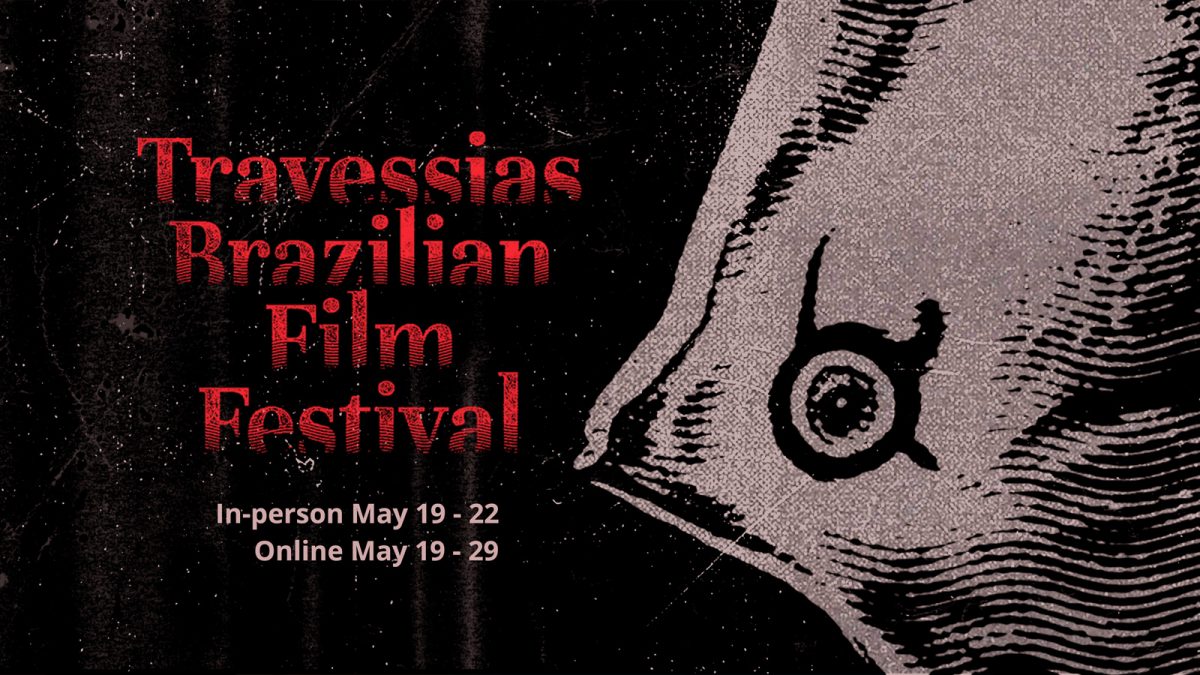Travessias Brazilian Film Festival 2022 [Hybrid]
About
May 19–22 [In-Person] / May 19–29 [Online]

Curator's statement: Cinema, presente!
Opening Night Concert!
Short Film Programs:
Feature Films:
Island (Ilha)
(in-person May 20 at 7pm & May 21 at 5pm | online May 19–29)
(Ary Rosa & Glenda Nicácio, Brazil, 2018, 96 min, in Portuguese with English subtitles)
In the meta thriller Island, a drug dealer named Emerson kidnaps Henrique, an esteemed director, and brings him to a secluded island. Emerson demands Henrique’s help in crafting his magnum opus, a film meant to erase the lines between fiction and reality. Over the course of auditions and rehearsals, all with local townspeople, Emerson pushes the boundaries of “organic” cinema, sometimes with dangerous consequences. Mining dark humor out of Emerson’s grandiosity, Island is a wild ride through the currents of artistic obsession.
This Land is Our Land! (Nũhũ yãg mũ yõg hãm: essa terra é nossa!)
(in-person May 21 at 4:30pm | online May 19–29)
(Isael Maxakali, Sueli Maxakali, Carolina Canguçu & Roberto Romero, Brazil, 2020, 70 min, in Portuguese with English subtitles)
This Land is Our Land! is a powerful and urgent profile of the Maxakali or Tikmu’un, a Brazilian indigenous group struggling with the impacts of deforestation and white vigilante violence. Threaded through with folklore and ancient wisdom, the film implores the viewer to remember that “The earth is our kin!”
Its Tikmu’un subjects wander through a landscape transformed by agriculture: trees replaced with cattle feed, ponds no longer hospitable to fish, roads overtaken by native plants, and fields cordoned off with barbed wire. Even the limits of their reserve have been encroached upon in recent years. As they walk familiar, primordial paths, they pray that the land will one day belong to them and the yãmĩyxop spirits once again.
Animated by raw anger and resentment, they also decry a double standard where murders against Tikmu’un go unpunished while they are over-penalized for petty crimes. Tense interactions with hostile white strangers are evidence of pervasive prejudice. But as This Land is Our Land! powerfully demonstrates, the Maxakali remain defiant in the face of colonization, determined to tell their stories. They will continue to chant in unison, “This land is our land!”
Sun Inside (Um filme de verão)
(in-person May 21 at 7pm & May 22 at 4:30pm | online May 19–29)
(Jo Serfaty, Brazil, 2019, 94 min, in Portuguese with English subtitles)
Sun Inside tells the interlinked stories of four Brazilian teens living in the slums of Rio de Janeiro as they graduate into an uncertain future. The good-natured Junior films everything around him on his shaky hand-held camera. His sarcastic best friend Karol fantasizes about living in Japan while fruitlessly job-hunting. Their friends Caio and Ronaldo struggle to define their Yoruba-Christian faith and sexuality, respectively. In a landscape of dilapidated housing and skies crowded with power lines, they learn to make their own fun. Yet the turmoil of power outages, water shortages, and teacher strikes is always threatening to encroach.
Sun Inside captures the energy of languid afternoons at the beach and intoxicating nights at underground concerts. In tracing the currents of exhilaration and boredom, self-discovery and self-doubt, the film poignantly explores what it means to be on the cusp of adulthood.
My Own Private Hell (Inferninho)
(in-person May 22 at 7pm | online May 19–29)
(Guto Parente & Pedro Diógenes, Brazil, 2018, 82 min, in Portuguese with English subtitles)
Inferninho takes place entirely in a dimly-lit bar populated by an eccentric array of drunks, artists, and wanderers of various kinds. The arrival of a sensitive sailor named Jarbas shakes up the bar’s glamorous owner, Deusimar. Bound by a shared wit, the two quickly fall into an intense love affair. But problems pile up for the couple when Jarbas’ debt collectors come calling and a menacing salesman tries to buy Deusimar’s property. With a campy aesthetic and imaginative fantasy sequences, Inferninho explores the clash between pragmatism and the desire for self-reinvention.
Travessias 2022 Curators' Bios
Emanuella Rodrigues de Moraes
she/her/hers
Emanuella Rodrigues de Moraes has experience as a researcher, university lecturer and curator in Brazil. She received her PhD in Culture and Society at the Federal University of Bahia. She also was a post-doctoral research fellow at the University of Washington, Seattle, supervised by Professor Jonathan Warren, having studied Contemporary Brazilian Cinema, Gender and Race.
Livia Azevedo Lima
she/her/hers
Livia Azevedo Lima is a book editor, writer and researcher on the verge of finishing a PhD on Brazilian Modern Cinema and Literature at the University of São Paulo. She was born in Rio de Janeiro, lived in São Paulo for the past decade and is currently based in Seattle.
Calac Nogueira
he/him/his
Calac Nogueira is a Brazilian film critic, researcher, curator and filmmaker based in Seattle. He is currently a PhD student at the University of Washington. In 2020, he programmed in Brazil the retrospective Lumière cineasta, in which the Lumière views were presented along with films from a variety of other directors, countries, and times.
About the Co-presenting Orgs
